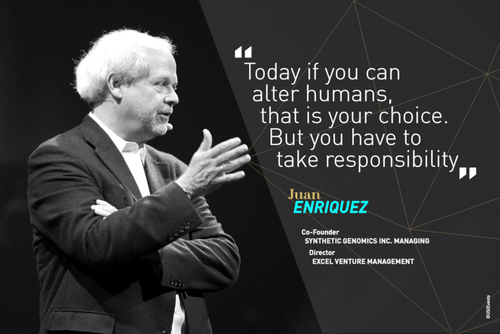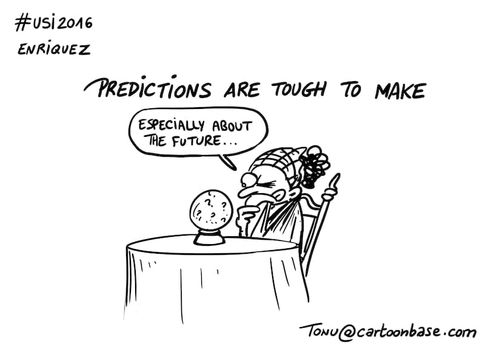Juan Enriquez - What if biology was the most powerful tool ever detained by human beings?
Homo Evolutis: how humans are shaping their very own evolutionnary path.
Evolution is mankind’s greatest adventure. The Homo Sapiens could soon give way to a new species emerged out of technologies developed by him.
Moreover, in the context of this technological evolution, new sectors of economics have appeared with a growing interest in ethics, societal matters or morals. We live in a digital world: a society in transition where Man, as usual, uses his resources to modify life around him in order to satisfy his needs, but this time developing a smart design of reality. In the past, biology was the science of observation, but it has now become the science of intervention. This awareness is probably the most powerful tool ever detained by human beings.
The challenges of our future
When we were a younger “species”, only nature could proceed to a natural selection of individuals. Today, we have conquered that power: we can artificially select. We choose what can live and what must die on the surface of the Earth – thus creating systems of parallel creation… With the advent of robotics and biotechnology, mankind can make fellow men and women evolve more rapidly.
Is it normal that cholera and tuberculosis still kill millions of people each year?
According to Juan Enriquez, what isn’t normal is that we haven’t yet tried our best to put an end to these epidemics. Thanks to our discoveries in biology, we have slowed the rise of some epidemics, while others have appeared… These days we are able to modify cells in a very simple manner to produce drugs. In the past, the latter were made from chemical models. Today, we produce genetically modified cells directly.
“We are close to extinction”
Juan Enriquez explains: “There are more human beings, but there is no genetic diversity left. There is more genetic diversity within a group of fifty-five chimpanzees than within a group of seven billion humans”. However, despite some similarities, we still have specificities that differentiate us. Top level athletes are the perfect example. With their distinctive abilities they achieve physical feats during competitions, which is not the case for everyone.
In this new era, it is crucial for human beings to be aware of moral issues. “It is essential that we accept one another’s choices, that we respect our moral codes and those of others”. Moreover, we would have to leave a quarter of our terrestrial surface untouched for Darwinian laws to apply without Man’s influence.
Shows of strength and hands of steel
What will humans look like in the future? The further we move forward in time, the more technology improves. And it is going to continue developing, until it becomes necessary.
For instance, thanks to technology, amputated people receive artificial limbs. What if tomorrow, the disabled were those who lived without prosthetics?
Hearing aids or pacemakers are other examples of this revolution. Imagine for one moment that you could amplify sounds to hear a conversation far from where you are… In fact, there are other dimensions on which we can act and therefore change the human code. With biology, it is already possible to make human tissues to then create new species or foods.
Read more : Our interview with Juan Enriquez - "It's all the experiments we make that lead to a revolution"
Understanding the human body
But let us be cautious: we need to understand this human code and be aware of our responsibilities in the face of these changes. Even if fear may take over, humans must remain humble in the face of these changes. We must think and make the best decisions together for mankind.
To go further, discover Juan Enriquez’s talk on our Youtube channel and the questions asked by the participants during the conference.



